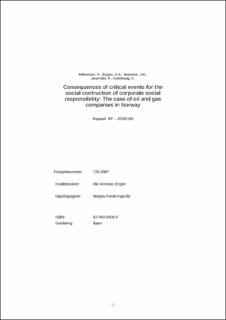| dc.contributor.author | Mikkelsen, Aslaug | |
| dc.contributor.author | Engen, Ole Andreas | |
| dc.contributor.author | Steineke, J.M. | |
| dc.contributor.author | Jøsendal, Kari | |
| dc.contributor.author | Grønhaug, K. | |
| dc.date.accessioned | 2020-08-26T13:25:03Z | |
| dc.date.available | 2020-08-26T13:25:03Z | |
| dc.date.issued | 2005 | |
| dc.identifier.isbn | 82-490-0400-0 | |
| dc.identifier.uri | https://hdl.handle.net/11250/2675170 | |
| dc.description.abstract | Applying a social constructivist approach, this paper examines the extent to which critical events in the oil and gas industry influence knowledge and knowledge transfer of corporate social responsibility (CSR). Public archive data and semi-structured interviews with key informants in the companies as well as with outside actors were applied to trace the critical events, influencing actors and consequences. Our findings reveal that types of events and influencing actors changed over the years, as has the content of CSR. Social dialogues and partnerships became tools for knowledge creation and new perspectives on “secondary” risk management as much as for tools to improve the environmental and social impact of the companies’ activities. An implication of this situation seems to be that CSR is seen as a secondary risk assignment and as a competitive advantage with a knowledge spillover risk to other companies. | en_US |
| dc.description.sponsorship | Norges Forskningsråd | en_US |
| dc.language.iso | eng | en_US |
| dc.publisher | Rogalandsforskning | en_US |
| dc.title | Consequences of critical events for the social contruction of corporate social responsibility | en_US |
| dc.title.alternative | The case of oil and gas companies in Norway | en_US |
| dc.type | Research report | en_US |
| dc.source.pagenumber | 51 | en_US |
